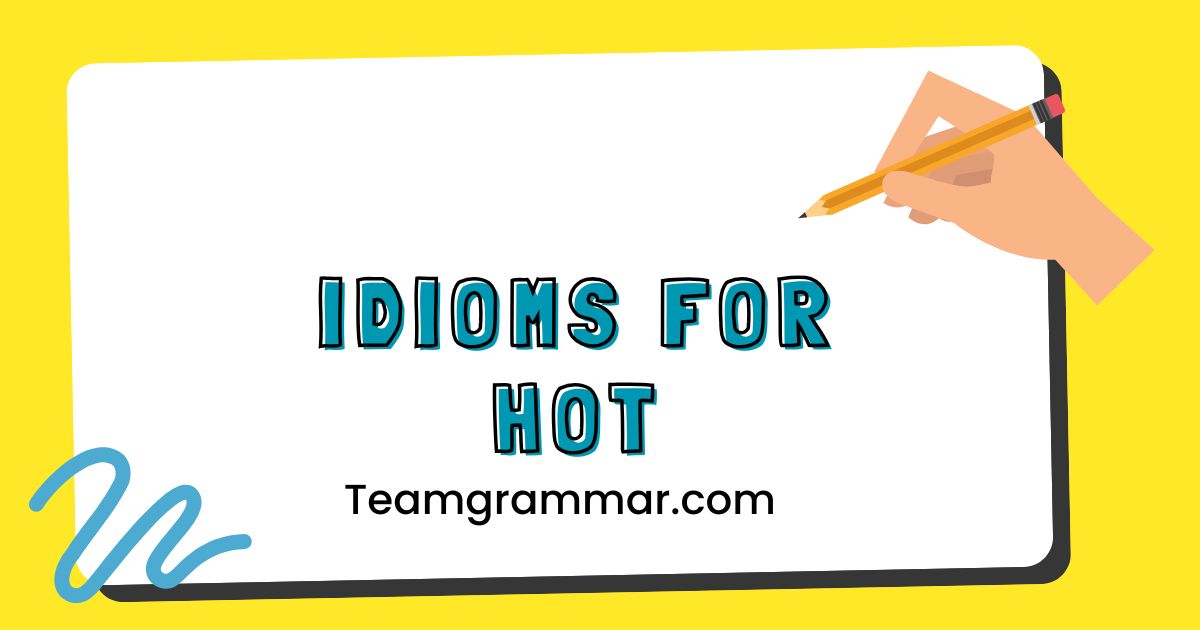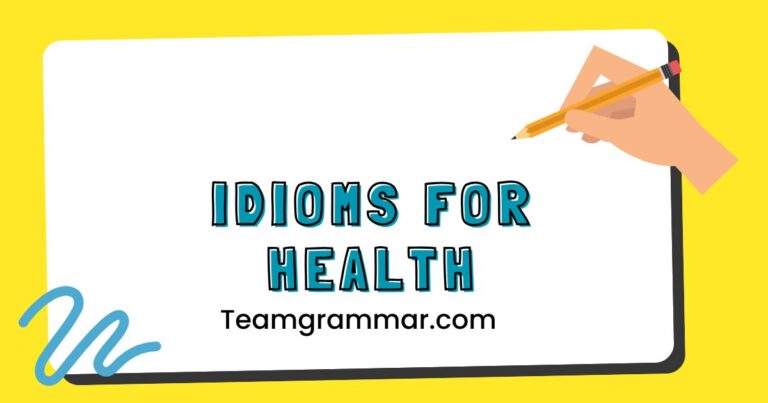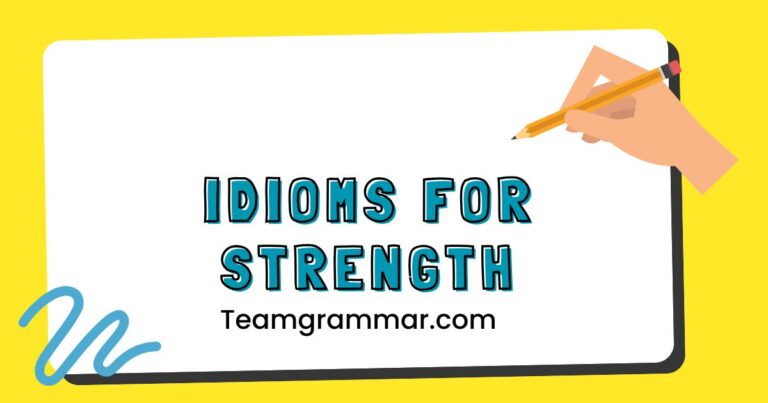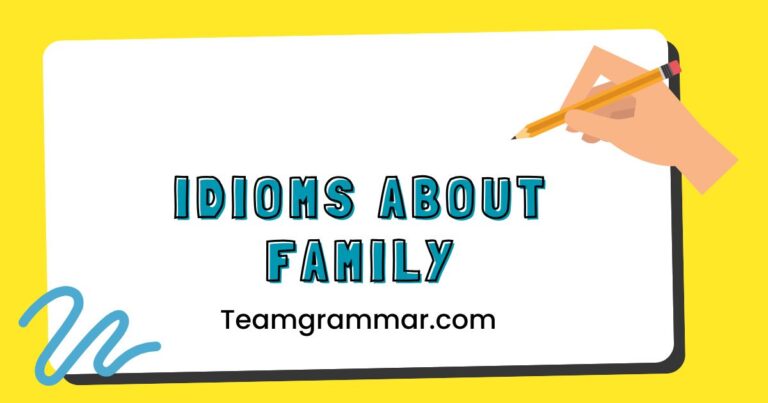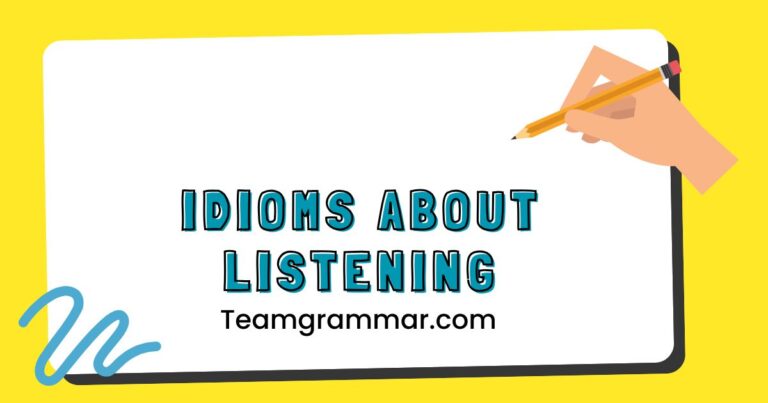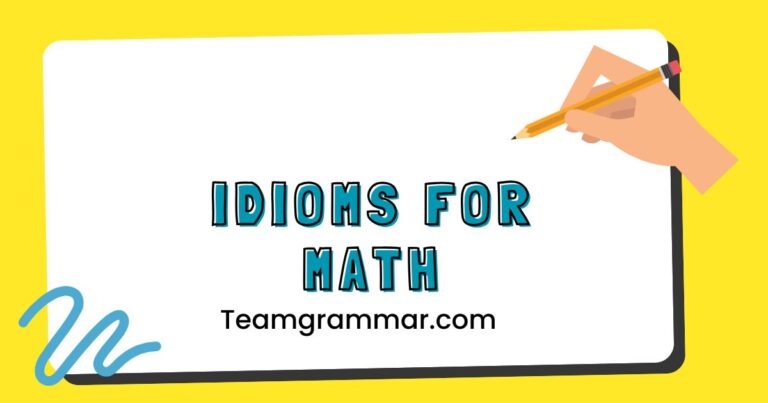39 Idioms for Hot: Mastering Figurative Language in English
Understanding idioms is crucial for mastering English, especially when describing something as ‘hot.’ Idioms add color and nuance to our language, allowing us to express ourselves more vividly and creatively. This article explores a wide range of idioms related to heat, providing clear definitions, examples, and practice exercises.
Whether you’re a beginner or an advanced learner, this guide will help you confidently use these idioms in everyday conversations and writing.
This comprehensive article is designed for English language learners of all levels, from beginners to advanced speakers. Native English speakers looking to refresh their knowledge of idioms will also find valuable insights.
By studying these idioms, you’ll enhance your comprehension of spoken and written English, improve your fluency, and gain a deeper appreciation for the richness of the language.
Table of Contents
- Definition of Idioms for “Hot”
- Structural Breakdown of Idioms
- Types and Categories of “Hot” Idioms
- Examples of Idioms for “Hot”
- Usage Rules for Idioms
- Common Mistakes with “Hot” Idioms
- Practice Exercises
- Advanced Topics in Idiomatic Usage
- Frequently Asked Questions
- Conclusion
Definition of Idioms for “Hot”
An idiom is a phrase or expression whose meaning cannot be understood from the literal meanings of its individual words. Instead, it has a figurative meaning known through common usage.
Idioms related to “hot” are used to describe various concepts beyond just temperature, including attractiveness, popularity, anger, skill, and urgency. Understanding these idioms requires recognizing the implied meaning rather than simply translating the words.
Idioms often develop over time through cultural and historical contexts. The meaning behind “hot” idioms can vary depending on the region and social group using them.
For example, an idiom used to describe a person’s attractiveness in one culture might not have the same connotation or even be understood in another. Therefore, context is essential when interpreting and using idioms effectively.
Structural Breakdown of Idioms
The structure of idioms can vary greatly. Some idioms are simple phrases, while others are complex sentences.
Many idioms contain verbs, nouns, adjectives, and prepositions, working together to create a unique meaning. Recognizing the grammatical structure of an idiom can sometimes help in understanding its function, although the meaning is primarily determined by common usage and cultural context.
Idioms often defy standard grammatical rules. For example, the phrase “hot under the collar” uses a prepositional phrase (“under the collar”) in a way that doesn’t literally describe temperature.
The expression’s meaning is derived from the cultural association of a tight collar with discomfort and anger. Furthermore, some idioms are fixed expressions, meaning that the words cannot be changed or rearranged without altering the meaning or making the phrase nonsensical.
Types and Categories of “Hot” Idioms
Idioms related to “hot” can be categorized based on the concept they represent. Here are some key categories:
Weather-Related Idioms
These idioms describe the actual temperature or weather conditions.
Attractiveness-Related Idioms
These idioms describe someone’s physical attractiveness or desirability.
Popularity-Related Idioms
These idioms describe something that is currently very popular or in demand.
Temper-Related Idioms
These idioms describe a state of anger or frustration.
Skill-Related Idioms
These idioms describe someone’s proficiency or expertise in a particular area.
Examples of Idioms for “Hot”
The following sections provide extensive examples of idioms for “hot,” categorized by their respective meanings. Each example is presented in a sentence to illustrate its usage in context.
Weather-Related Idioms
Here’s a table showcasing weather-related idioms using “hot.”
| Idiom | Meaning | Example Sentence |
|---|---|---|
| Hot as hell | Extremely hot | It’s hot as hell outside today; I’m staying inside with the AC. |
| Hot enough to fry an egg on the sidewalk | Extremely hot | It’s hot enough to fry an egg on the sidewalk; let’s go to the beach. |
| In the hot seat | In a difficult or pressured situation | The CEO is in the hot seat after the company’s poor performance. |
| Indian summer | A period of warm weather in late autumn | We’re having an Indian summer this year, which is great for outdoor activities. |
| Hot spell | A period of unusually hot weather | The city is experiencing a hot spell, with temperatures reaching record highs. |
| Heatwave | A prolonged period of abnormally hot weather | The heatwave caused many elderly people to seek shelter in cooling centers. |
| Hot air | Empty or exaggerated talk | His promises are just hot air; he never follows through. |
| Blow hot and cold | To alternate between favorable and unfavorable opinions | He blows hot and cold on the project, making it hard to plan. |
| Make it hot for someone | To create problems or difficulties for someone | The police are going to make it hot for the criminals in this city. |
| Hot on the heels of | Following closely behind | The detective was hot on the heels of the suspect. |
| Hot property | Something that is very desirable or in demand | That new smartphone is hot property right now. |
| Hot potato | A controversial or difficult issue | The issue of tax reform is a hot potato for politicians. |
| Hot ticket | A ticket that is very difficult to get | Tickets to the concert are a hot ticket; they sold out in minutes. |
| Hot stuff | Someone who is very skilled or talented | She’s hot stuff when it comes to coding. |
| Hot rod | A car that has been modified for speed and appearance | He loves working on his hot rod in the garage. |
| Hot water | A difficult or problematic situation | He’s in hot water with his boss after missing the deadline. |
| Hot off the press | Newly released or published | The news is hot off the press and everyone is talking about it. |
| Hot streak | A period of continued success | The team is on a hot streak, winning every game this month. |
| Hot tip | A piece of inside information | I got a hot tip about a stock that’s about to rise. |
| Hotbed | A place where something is actively developing | The city is a hotbed of innovation and technology. |
| As hot as fire | Extremely hot | The metal was as hot as fire after being in the furnace. |
| Too hot to handle | Too difficult or dangerous to deal with | The situation became too hot to handle, so they called the authorities. |
| Hot headed | Having a quick temper; easily angered | He’s hot headed and often regrets what he says in anger. |
| Hot pursuit | An immediate and active chase | The police were in hot pursuit of the fleeing suspect. |
| Run hot and cold | To alternate between enthusiasm and disinterest | She runs hot and cold on the idea of moving to a new city. |
This table provides a range of weather-related idioms using “hot,” illustrating how the word can extend beyond literal temperature to describe situations and events.
Attractiveness-Related Idioms
Here are some idioms used to describe someone’s attractiveness.
| Idiom | Meaning | Example Sentence |
|---|---|---|
| Hot | Attractive or sexy | She looked absolutely hot in that red dress. |
| Smoking hot | Extremely attractive | He’s smoking hot; I can’t take my eyes off him. |
| Hottest thing since sliced bread | Something very popular or attractive | That new celebrity is the hottest thing since sliced bread. |
| Hot to trot | Sexually eager | After their date, she seemed hot to trot. |
| Hot pants | Very short shorts, considered fashionable and sexy | She wore hot pants to the party and turned heads. |
| Like a hottie | Very attractive person | He’s a real hottie, isn’t he? |
| Hot stuff | Attractive person | Everyone thinks she’s hot stuff. |
| Red-hot | Extremely attractive or exciting | The model looked red-hot on the cover of the magazine. |
| Eye candy | Visually appealing (often used for attractive people) | The show is full of eye candy, both male and female. |
| Easy on the eyes | Pleasing to look at | He’s definitely easy on the eyes. |
| A sight for sore eyes | Someone or something that is very welcome or pleasing to see | After a long day at work, seeing her was a sight for sore eyes. |
| Drop-dead gorgeous | Extremely beautiful or attractive | She looked drop-dead gorgeous at the gala. |
| Stunning | Extremely impressive or attractive | Her beauty was absolutely stunning. |
| Knockout | An extremely attractive person | She’s a real knockout. |
| Foxy | Attractive or sexually appealing | He thought she looked foxy in her new outfit. |
| Ravishing | Extremely attractive or delightful | She looked ravishing in her wedding dress. |
| Alluring | Attractive and tempting | Her smile was alluring and captivating. |
| Glamorous | Attractive in an exciting and special way | She always looks glamorous at parties. |
| Captivating | Capable of attracting and holding interest; charming | Her performance was captivating from start to finish. |
| Enchanting | Delightfully charming or attractive | The garden was an enchanting place to spend the afternoon. |
| Fetching | Attractive | She looked quite fetching in her summer dress. |
| Gorgeous | Very attractive | He thought she was absolutely gorgeous. |
| Lovely | Beautiful; attractive | She has a lovely smile. |
| Pretty | Attractive in a delicate way without being truly beautiful | She’s a pretty girl. |
| Beautiful | Pleasing the senses or mind aesthetically | She’s a beautiful woman. |
This table illustrates how “hot” and related terms are used figuratively to denote physical attractiveness, going beyond mere temperature.
Popularity-Related Idioms
The following table includes idioms that describe something that is currently very popular or in demand.
| Idiom | Meaning | Example Sentence |
|---|---|---|
| Hot ticket | Something very popular or in demand | The new play is a hot ticket; everyone wants to see it. |
| Hot item | A popular or trendy product | This year’s must-have toy is a hot item for the holidays. |
| Hot property | A person or thing that is highly sought after | She’s hot property in the modeling world right now. |
| What’s hot | What is currently popular or trendy | Do you know what’s hot in fashion this season? |
| Catching fire | Becoming popular or successful | Her career is really catching fire after the release of her new album. |
| Buzzworthy | Generating a lot of interest and excitement | The movie is incredibly buzzworthy; everyone is talking about it. |
| Trending | Currently popular or widely discussed online | The hashtag is trending on social media. |
| In vogue | Fashionable; popular at a particular time | Vintage clothing is in vogue again. |
| The in thing | Something that is currently fashionable or popular | Wearing bright colors is the in thing this summer. |
| All the rage | Very popular or fashionable at a particular time | Selfies are all the rage these days. |
| The latest craze | Something that is currently very popular | Virtual reality is the latest craze in gaming. |
| A must-have | Something that is essential to have; very popular | This gadget is a must-have for tech enthusiasts. |
| In demand | Wanted or needed by many people | Skilled programmers are always in demand. |
| Sought-after | Highly desirable | This antique is a sought-after collector’s item. |
| Popular | Liked or admired by many people | That restaurant is very popular with the locals. |
| Trendy | Very fashionable or up-to-date | She always wears the most trendy clothes. |
| Fashionable | Following the current fashion | Wearing hats is becoming more fashionable again. |
| Chic | Elegantly and stylishly fashionable | Her style is very chic. |
| Up-to-date | Modern; fashionable | His knowledge of technology is very up-to-date. |
| Contemporary | Belonging to the present time | The museum features a collection of contemporary art. |
| Modern | Relating to the present or recent times | The building has a very modern design. |
| Current | Belonging to the present time | The current trends in music are constantly changing. |
| Leading-edge | The most advanced or innovative | The company is known for its leading-edge technology. |
| Cutting-edge | Extremely modern and advanced | Their research is at the cutting-edge of science. |
| State-of-the-art | The most up-to-date technology or design | The hospital has state-of-the-art equipment. |
This table provides examples of how “hot” and related terms are used to describe popularity and current trends, highlighting their figurative usage.
Temper-Related Idioms
The following table presents idioms that describe a state of anger or frustration, often drawing a parallel with the sensation of heat.
| Idiom | Meaning | Example Sentence |
|---|---|---|
| Hot under the collar | Angry or agitated | He got hot under the collar when he heard about the mistake. |
| Blow a fuse | To become very angry | My dad blew a fuse when I crashed the car. |
| See red | To become very angry | I saw red when he insulted my family. |
| Hot-tempered | Easily angered | He’s hot-tempered and often overreacts. |
| Fly off the handle | To lose one’s temper | He flew off the handle when he realized he’d been cheated. |
| Get steamed up | Become angry or excited | Don’t get steamed up over such a small issue. |
| In a rage | Extremely angry | He was in a rage after losing the game. |
| Lose one’s cool | To become angry or lose composure | She lost her cool during the argument. |
| Hit the roof | To become very angry | My parents will hit the roof if they find out. |
| Go ballistic | To become extremely angry | He went ballistic when he saw the damage. |
| Up in arms | Very angry and protesting strongly | The community is up in arms about the new development. |
| Livid | Extremely angry | She was livid when she found out the truth. |
| Fuming | Very angry | He was fuming after the meeting. |
| Beside oneself with rage | Overcome with anger | He was beside himself with rage when he heard the news. |
| Incensed | Very angry; enraged | The public was incensed by the politician’s comments. |
| Outraged | Extremely angry | She was outraged by the unfair treatment. |
| Seething | Intensely angry but keeping it hidden | He was seething with anger but tried to remain calm. |
| Irate | Feeling or showing extreme anger | The customer was irate about the poor service. |
| Wrathful | Full of or characterized by intense anger | His wrathful outburst surprised everyone. |
| Choleric | Easily angered; bad-tempered | His choleric personality made him difficult to work with. |
| Exasperated | Intensely irritated and frustrated | She was exasperated by his constant interruptions. |
| Annoyed | Slightly angry; irritated | He was annoyed by the noise outside. |
| Irritated | Slightly angry; annoyed | She felt irritated by the slow internet connection. |
| Cross | Annoyed or angry | He was cross with her for being late. |
| Upset | Unhappy, disappointed, or worried | She was upset by the news. |
This table demonstrates how idioms use the concept of “hot” to describe intense emotions, particularly anger and frustration, by associating them with the physical sensation of heat.
Skill-Related Idioms
This table presents idioms that describe someone’s proficiency or expertise in a particular area. Note that these idioms generally do not use the word “hot” directly, but relate to the concept of being skilled or proficient.
| Idiom | Meaning | Example Sentence |
|---|---|---|
| Ace in the hole | A hidden advantage or resource | He had an ace in the hole that he used to win the negotiation. |
| Sharp as a tack | Very intelligent or clever | She’s as sharp as a tack; she always knows the answer. |
| Know one’s stuff | To be knowledgeable about a particular subject | He really knows his stuff when it comes to computers. |
| On the ball | Alert, competent, and efficient | She’s really on the ball; she gets everything done on time. |
| Have a knack for | To have a natural talent for something | He has a knack for fixing things. |
| Gifted | Having exceptional talent or natural ability | She’s a gifted musician. |
| Talented | Having a natural aptitude or skill for something | He’s a talented writer. |
| Proficient | Competent or skilled in doing or using something | She’s proficient in several languages. |
| Adept | Very skilled or proficient at something | He’s adept at solving complex problems. |
| Master of | Having complete control or skill | He’s a master of his craft. |
| Expert | A person with special knowledge or skill in a particular area | She’s an expert in environmental law. |
| Seasoned | Experienced and skilled in a particular activity | He’s a seasoned professional with years of experience. |
| Veteran | A person with long experience in a particular field | She’s a veteran journalist. |
| Well-versed | Knowing a lot about something | He’s well-versed in history. |
| Accomplished | Highly skilled; proficient | She’s an accomplished pianist. |
| Astute | Having or showing an ability to accurately assess situations or people and turn this to one’s advantage | He’s an astute businessman. |
| Savvy | Having or showing perception, comprehension, or shrewdness, especially in practical matters | She’s savvy when it comes to social media. |
| Ingenious | Clever, original, and inventive | His solution to the problem was ingenious. |
| Resourceful | Able to deal skillfully and promptly with new situations, difficulties, etc. | She’s a resourceful problem solver. |
| Versatile | Able to adapt or be adapted to many different functions or activities | He’s a versatile actor. |
| Multifaceted | Having many aspects or features | Her talent is multifaceted. |
| All-rounder | A person with many different skills and abilities | He’s an all-rounder in the team. |
| Competent | Having the necessary ability, knowledge, or skill to do something successfully | She’s a competent worker. |
| Capable | Having the ability, fitness, or quality necessary to do or achieve a specified thing | He’s capable of handling the project. |
| Efficient | Achieving maximum productivity with minimum wasted effort or expense | She’s an efficient manager. |
Although this table does not explicitly use “hot” idioms, it illustrates how various terms and phrases convey the idea of skill and expertise, which can be conceptually linked to the idea of being “hot” in one’s field.
Usage Rules for Idioms
Using idioms correctly requires careful attention to context and audience. Here are some general rules:
- Context is Key: Make sure the context aligns with the idiom’s meaning. For example, using “hot under the collar” to describe the weather would be incorrect.
- Audience Awareness: Be mindful of your audience’s familiarity with the idiom. Some idioms are more common in certain regions or age groups.
- Avoid Overuse: Using too many idioms can make your speech sound unnatural or forced.
- Maintain Correct Form: Idioms are often fixed expressions. Changing the words can alter the meaning or make the phrase nonsensical.
- Understand Nuances: Some idioms have subtle differences in meaning or connotation. Be aware of these nuances to use them accurately.
Idiomatic expressions can be used to enhance communication, but misuse can lead to misunderstandings. It’s often beneficial to observe how native speakers use idioms in various contexts to gain a better understanding of their appropriate usage.
Regularly reading English literature and watching English-language media can also help familiarize yourself with idiomatic expressions.
Common Mistakes with “Hot” Idioms
Learners often make mistakes when using idioms. Here are some common errors and how to avoid them:
| Incorrect | Correct | Explanation |
|---|---|---|
| He is hot on head. | He is hot-headed. | “Hot-headed” is the correct idiom for describing someone with a quick temper. |
| I’m in hot waters. | I’m in hot water. | The correct idiom is “hot water,” not “hot waters.” |
| She is very hot looking. | She is very hot. | “Hot” is already an adjective describing attractiveness; “hot looking” is redundant. |
| The news was hot from the press. | The news was hot off the press. | The correct idiom is “hot off the press,” meaning newly released. |
| He blew a bulb. | He blew a fuse. | The idiom “blew a fuse” means to become very angry. |
| She’s getting hot under her shoes. | She’s getting hot under the collar. | The idiom “hot under the collar” means to become angry or agitated. |
Avoiding these common mistakes involves careful listening and reading to familiarize yourself with the correct forms of idioms. Paying attention to how native speakers use these expressions is essential for accurate usage.
Regularly reviewing common idioms and their proper context can also help reinforce correct usage and prevent errors.
Practice Exercises
Test your understanding with these practice exercises. Fill in the blanks with the correct idiom.
| Question | Answer |
|---|---|
| 1. After missing the deadline, he was really ________ with his boss. | in hot water |
| 2. The new smartphone is a real ________; everyone wants one. | hot item |
| 3. She ________ when she heard the insulting comments. | saw red |
| 4. He’s ________ when it comes to computer programming. | hot stuff |
| 5. The issue of climate change is a political ________. | hot potato |
| 6. The detective was ________ of the suspect. | hot on the heels |
| 7. She looked ________ in her new dress. | smoking hot |
| 8. He ________ when his car was damaged. | blew a fuse |
| 9. The tickets for the concert are a ________. | hot ticket |
| 10. Don’t ________ over such a small mistake. | get hot under the collar |
| 11. The city is a ________ of artistic activity. | hotbed |
| 12. The team is on a ________, winning all their games. | hot streak |
| 13. The scandal is ________, everyone is talking about it. | hot off the press |
| 14. The metal was ________ after being in the furnace. | as hot as fire |
| 15. The situation became ________, so they called the authorities. | too hot to handle |
These exercises are designed to reinforce your understanding of the idioms discussed in this article. Regular practice is key to mastering the correct usage of these expressions.
Advanced Topics in Idiomatic Usage
For advanced learners, exploring the historical and cultural origins of idioms can provide deeper insights into their meanings and appropriate usage. Many idioms have roots in specific historical events, social customs, or literary works.
Understanding these origins can enhance your appreciation for the nuances of the English language.
Another advanced topic is the use of idioms in creative writing. Skilled writers often use idioms to add depth, humor, or authenticity to their work.
However, it’s essential to use idioms judiciously and avoid clichés. Experimenting with idioms in your writing can help you develop a more distinctive and engaging style.
Additionally, studying the works of accomplished writers can provide valuable examples of effective idiomatic usage.
Frequently Asked Questions
- What is the difference between an idiom and a literal expression?
An idiom is a phrase whose meaning is different from the literal meanings of the individual words, while a literal expression means exactly what the words say.
- Why is it important to learn idioms?
Learning idioms helps you understand native speakers better, improves your fluency, and enriches your communication.
- How can I improve my understanding of idioms?
Read widely, listen to native speakers, and practice using idioms in context.
- Are idioms universal across all English-speaking countries?
No, some idioms are specific to certain regions or countries.
- Can I create my own idioms?
While it’s possible, idioms are generally established through common usage over time.
- How do I avoid misusing idioms?
Pay attention to context, be aware of your audience, and practice using idioms correctly.
- Is it okay to use idioms in formal writing?
It depends on the context. In general, it’s best to avoid idioms in highly formal or academic writing.
- Where can I find more examples of idioms?
Dictionaries, idiom websites, and English literature are great resources.
- How often should I study idioms?
Regular, consistent study is best. Even a few minutes each day can make a difference.
- Are there any apps that can help me learn idioms?
Yes, many language learning apps include lessons on idioms.
Conclusion
Mastering idioms related to “hot” and other concepts significantly enhances your English language skills. By understanding the definitions, structural nuances, and appropriate usage of these expressions, you can communicate more effectively and confidently.
Remember to practice regularly, pay attention to context, and be mindful of your audience. With dedication and consistent effort, you’ll be well on your way to mastering the art of idiomatic expression.

